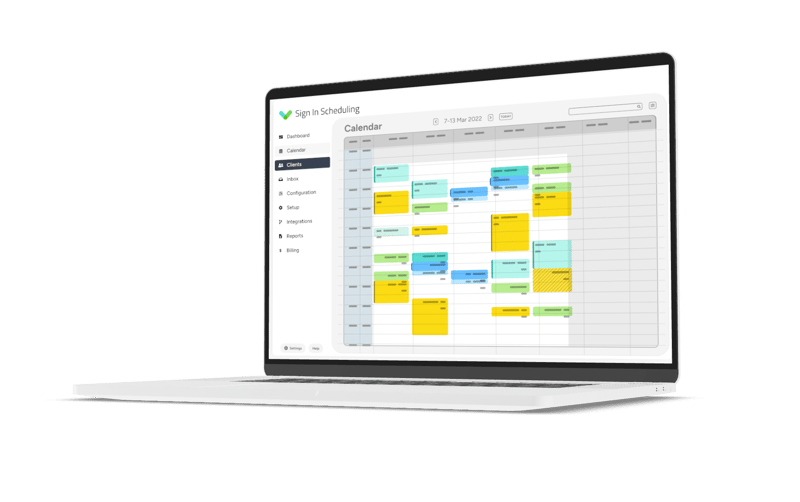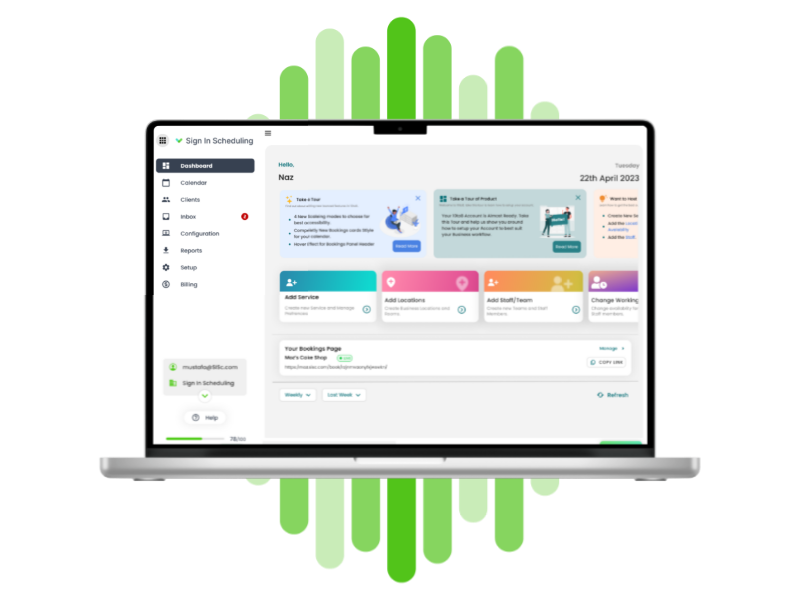For some time now, voice booking has been considered the future of technology. We are living in a...
Why Voice Technology is the Future of Online Appointment Scheduling
Have you ever wanted to make an appointment online but found it too difficult or time-consuming? If so, voice technology might be the solution for you.
Voice recognition software allows people to book appointments and do other tasks with just their voice. It provides a new way for customers to interact with businesses while providing an easy-to-use and convenient system. It’s also helpful for people with disabilities or those who aren’t so good with modern technology.
Voice recognition technology is becoming more and more popular. It started simply, with the emergence of Siri back in 2011, followed by Alexa and Google Assistant. Now, we have voice recognition in our televisions, cars, refrigerators, smartwatches, speakers, and much more.
Voice technology is continuing to develop and evolve at a rapid pace. It may soon become the norm for all of us to use voice commands in place of typing or touching screens.
So we decided to explore what voice recognition technology is, why it is so great for business owners, the pros and cons of voice technology, and how voice will affect online scheduling in the future.
What is voice technology?
Before we dive into how voice recognition technology will affect the future, let’s go over what exactly it is.
Voice technology is the use of speech recognition and voice synthesis technologies to create, capture, transmit, receive or process human voice. It effectively mirrors human interaction.

Beginning in the early 1970s with research funded by DARPA’s Speech Understanding Research Program (SURP), scientists developed a text-to-speech reading technology that was able to read aloud any document placed into its scanner. This was then developed at Carnegie Mellon University in Pittsburgh by IBM scientists. They expanded its vocabulary to the point where it was able to comprehend 1011 words.
Following a couple more breakthroughs in the 1980s – when the Markov model used statistics to determine the probability of a word – voice recognition continued to develop. It has revolutionized the way we do things
These days, voice technology is now being used in many applications, such as social media, general household requests, and voice booking for appointments.
How does voice recognition technology work?
You might be wondering about the science behind all this. Does Alexa actually hear what you’re saying? Does she listen to every conversation you have? And most importantly, how does she understand the coherence of complex sentences?
How does this technology actually work?
Well, voice recognition works by using voice-to-text technology.
This is a type of speech recognition that converts spoken words into text. As well as voice tech, this allows for the easy input of information in formats such as email and web search fields, instead of typing out messages on mobile devices or computers.
Assistants like Alexa, Siri, or Google Assistant, listen to what you say and translate it literally – word by word – into text. This used to be done without any context, which of course, led to some mistakes when transcribing sentences. But lately, you might have noticed that your voice assistant can capture some context from previous searches and behavior history.
Once the assistant has an idea of what you’ve said, it then performs a web search, checks a fact, or carries out instructions such as ordering a pizza or even voice-booking a beauty appointment, based on what you asked.
It’s also worth noting that voice recognition and speech recognition are not the same things:
- Voice recognition is a type of speech recognition that converts spoken words into text.
- Speech recognition is the process of converting a person’s utterances to an abstract representation used for pattern matching and classification purposes.
Today, voice recognition software is able to understand words with incredible accuracy. But they sometimes still have trouble when listening to people who speak fast or slur their words together – especially with accents from different regions or languages.
When using voice recognition technology, make sure to speak clearly and with good pronunciation. As this technology continues to advance, it will also get more accurate.
Voice recognition and online appointment booking
When it comes to online appointment scheduling, voice recognition is becoming more and more promising.

Not only is it an efficient way to schedule an appointment, but voice recognition software can also be used to answer the phone, take surveys and even provide personal information.
Voice technology saves time because appointments are booked quickly, which means that receptionists, admin staff, or booking agents have more time to focus on other tasks. Plus, for people who are less tech-savvy or have a disability, voice technology is a lifesaver.
What are the advantages of voice technology?
There are plenty of advantages to voice bookings. It’s faster, more personal, and it improves the accessibility of online appointment scheduling. You can do voice bookings from any mobile device, and they work on both iOS and Android operating systems. Voice booking is also an excellent option for those who are sight-impaired or have other disabilities that make it hard to interact with a computer screen.
In today’s modern world, everyone wants everything instantly – voice bookings are often quicker than both waiting on hold with a receptionist and trying to fill in an online form – especially if you have a disability. It also saves countless hours of admin time.
In fact, we took a deeper dive into the pros of voice booking in this article.
What are the disadvantages of a voice recognition system?
Now that we’ve covered the advantages, what are some of the cons of voice recognition?
There are main disadvantages of using voice as opposed to traditional keyboard input: privacy issues, regulatory issues, and data entry accuracy. Also, although it improves accessibility for some, deaf or mute people will find it impossible to use.
Let’s dive deeper into those issues.
Privacy issues
There are a few issues with voice technology and privacy. It’s sometimes difficult to ensure complete privacy when booking appointments and voice input might be recorded without consent.
According to a Microsoft report, 41% of voice users are concerned about issues like passive listening, which is where a device records your voice without your knowledge. This can be a serious blocker in adopting this kind of tech in some industries like banks and the medical industry where customer data security is vital.
Regulatory issues
People are also concerned with how voice recognition affects regulatory compliance. Many companies have to comply with strict data protection laws like HIPPA, CCPA, or GDPR, and voice tech could cause an issue here.
Plus, voice data collected from sensitive areas could create serious problems if mishandled. If confidential information ends up in the wrong hands through leaked recordings of private phone calls, it could end in a severe lawsuit.
However, surprisingly enough voice recognition technology is actually helping with regulatory issues in some cases. For example, voice technology can be used to analyze conversations for dangerous content, monitor voice interactions at scale, identify data breaches, and transcribing all audio files for analysis.
Data entry accuracy
Lastly, voice recognition software is not yet as accurate as typing. This can be frustrating and time-consuming. It doesn’t always work the first time, can mishear you completely, and it might take a few tries to get your message or request understood correctly. This could lead you to give up completely, frustrated with the inconvenience.
Entering information into a system via keyboard or mouse typically yields more accurate data than voice input. This is partly because it has less room for error and partly because there’s such an accurate spell check on almost everything these days, that typos are usually corrected automatically.
In contrast, when you’re speaking, different accents or regional dialects could make voice recognition less accurate. Speech differs from person to person and the AI may have to understand jargon or slang, which could lead to errors in transcription between different speakers. Finally, there is also always potential for technical difficulties if you’re using an AI (artificial intelligence) instead of speaking to another human being.
How reliable is voice recognition?
If there are some issues with the accuracy of voice recognition, should you be worried if you’re looking to adopt it into your business or booking system?
In short, no. But it’s always good to take precautions.
Voice technology is very reliable and has many benefits for those using it. In a survey conducted by HSBC, over 76% of respondents said that they think voice recognition technology is more secure than fingerprints. In terms of reliability, Voice Biometrics has concluded that voice accuracy could be anywhere between 90% and 99%.
This means that you can expect companies in all industries including medical, legal, and financial services to adopt voice as they look towards how best to provide an efficient service without compromising on quality.
For now, there may still be some challenges, but these issues should not cause too much trouble for businesses that want to invest in voice recognition tech.
What is the future of voice technology?
The future of voice technology is unclear but its potential is limitless. There will always be new ways to use this powerful tool and it’s exciting to think about where it’ll be in another 20 years.
However, in terms of what could become automated by voice years from now, is hard to say. Companies may have to change the way they operate; online touchpoints could become listening points, and integrating voice recognition technology into apps (like 10to8), is one of the hottest trends right now.

Source: Medium
According to Globe Newswire, the voice and speech recognition market is expected to reach $26.8 billion by 2025. Even in our current times, it’s estimated that 1 in 4 US adults own a smart speaker like Google Home or Amazon Echo and by 2023, 93% of smartphones will likely be using a voice assistant.
Voice tech is becoming one of the hottest advancements in the medical technology market, the gaming industry, and the banking and finance industry.
In essence, voice recognition technology is on its way to becoming ubiquitous in our day-to-day lives. It’s easy to see why: voice tech has so many benefits and has been shown to increase productivity by 25%.
Voice booking will also change how we schedule appointments online – just like apps have done for mobile consumers. You’re now able to book an appointment from anywhere at any time of day just by logging into the app; soon, you’ll be able to book one simply by asking a question.
In conclusion...
Overall, voice technology has developed significantly, but it’s still in its infancy stage. There are some flaws that need to be ironed out, but one day, when we have perfected the tech, it could revolutionize many aspects of our lives.
Will voice completely replace visual and manual technologies? Surely not.
But it will slowly be embedded in areas where it makes sense; helping with efficiency, accessibility, and comfort.
We hope these thoughts have given some insight into why voice recognition technology is the future and will be crucial over the coming decades – if not sooner! What are your thoughts on voice tech? Let us know in the comments!






Blog comments